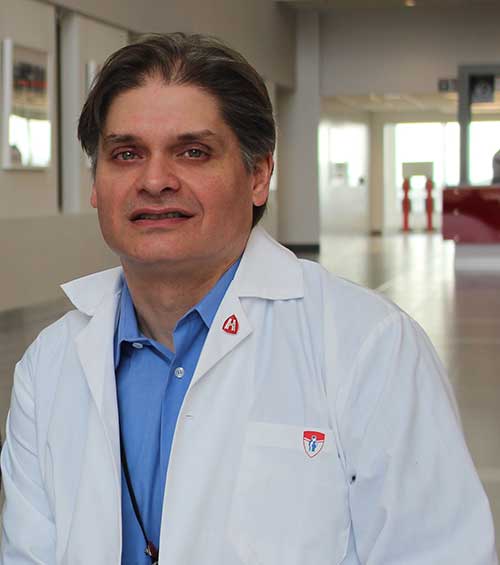$27.9M to develop novel therapeutics options for patients with cancer
The Quebec Cancer Consortium for Novel Therapeutics and Biomarkers (QCC), a collaboration between six leading hospital and cancer research centre sites based in Montreal led by McGill University’s Goodman Cancer Research Centre (GCRC) was awarded $10M in new funding from the Ministère de l’Économie et de l’Innovation (MEI) du Québec through its Fonds d’accélération des collaborations en santé (FACS) program. This award, together with additional contributions totalling $17.9M from 12 private, public and non-profit partners, will be invested to double patient recruitment in oncology clinical trials and develop infrastructure to support the development of personalized medicine and immunotherapies in Quebec.
Advancing precision oncology in the Quebec healthcare system
In the past decade, enhanced understanding of cancer has led to personalized therapeutic strategies centring on delivering the most appropriate therapy to individual patients or subgroups of patients based on clinical, molecular and immune system features of their disease. However, in most tumour types, only a subset of patients will benefit from this approach and many of these patients ultimately relapse.
To address this challenge, in 2017 the GCRC, along with the Research Institute of the McGill University Health Centre (RI-MUHC), the Segal Cancer Centre at the Jewish General Hospital (JGH), the Centre hospitalier de l’Université de Montréal (CHUM), the Hôpital Maisonneuve-Rosemont, and l’Institut de recherche en immunologie et cancérologie (IRIC), formed the QCC, partnering with non-profit organizations such as The Terry Fox Research Institute (TFRI) and l’Oncopole as well as pharmaceutical partners including Hoffman-La Roche, AstraZeneca, Bristol-Myers Squibb, Bayer and Merck in a collaborative effort to enhance patient response to personalized therapies.
QCC researchers and doctors will join forces to identify and develop new biomarkers that are better able to predict responses and adverse effects resulting from personalized treatments and immunotherapies, thereby improving patient outcomes. Cancer care costs are a heavy burden on the healthcare system. The development of new biomarkers to optimize treatment decisions will not only increase patient survival and reduce unnecessary treatments but will also curtail healthcare costs in Quebec.
“This initiative will build on existing Quebec government, philanthropic and industry investments in infrastructure,” says Dr. Morag Park, Director of the GCRC and lead investigator for this initiative. “As a consortium with access to approximately 16,000 cancer patients annually, doubling patient recruitment to clinical trials throughout the QCC and creating a ‘dynamic’ biobank of biospecimens collected in the context of clinical trials with new drugs will have a major impact on advancing science as well as increasing patient benefit. Together, this will attract more advanced oncology clinical trials to Quebec, providing enhanced clinical research opportunities, resulting in improved therapeutic options and outcomes for patients, maintaining and increasing private and pharma investment in the province and providing an oncology innovation and discovery pipeline.”
"This program will bring together the tremendous clinical and research expertise we enjoy in Quebec under one umbrella and toward a common goal: a better life for our patients and their families,” adds QCC co-investigator Dr. George Zogopoulos, pancreatic and liver surgeon and scientist from the Cancer Research Program of the RI-MUHC and at the GCRC. "This Quebec-wide collaborative effort will elevate clinical research opportunities, which are often the best treatment options for patients with cancers that are difficult to treat with current therapies."

This four-year project builds on the Montreal Cancer Consortium initiative launched last year by the TFRI to develop infrastructure platforms linking these hospitals and research centres, thus forming the Quebec node of the Marathon of Hope Cancer Centres Network. To achieve its goals, the QCC will also draw on the expertise of the Quebec – Clinical Research Organization in Cancer (Q-CROC), CATALIS Québec, Exactis Innovation, Quebec Cancer Coalition, Centre of Excellence on Partnership with Patients and the Public (CEPPP), the Cancer Research Network (RRCancer) and the Canadian Tissue Repository Network (CTRNet).
Additional co-investigators for the initiative include Dr. Gerald Batist at the Jewish General Hospital, Dr. Philip Wong and Dr. Fred Saad at the CHUM, and Dr. Denis Claude Roy at Hôpital Maisonneuve-Rosemont.
“The Quebec Cancer Consortium for Novel Therapeutics and Biomarkers (QCC) is leading the way in translating genomic-based discoveries into new therapeutic options for people with cancer,” said Martha Crago, Vice-Principal, Research and Innovation at McGill University. “This major investment by the Government of Quebec recognizes how collaborative science is transforming oncology research and will ensure that Quebec remains at the leading edge of cancer care.”

